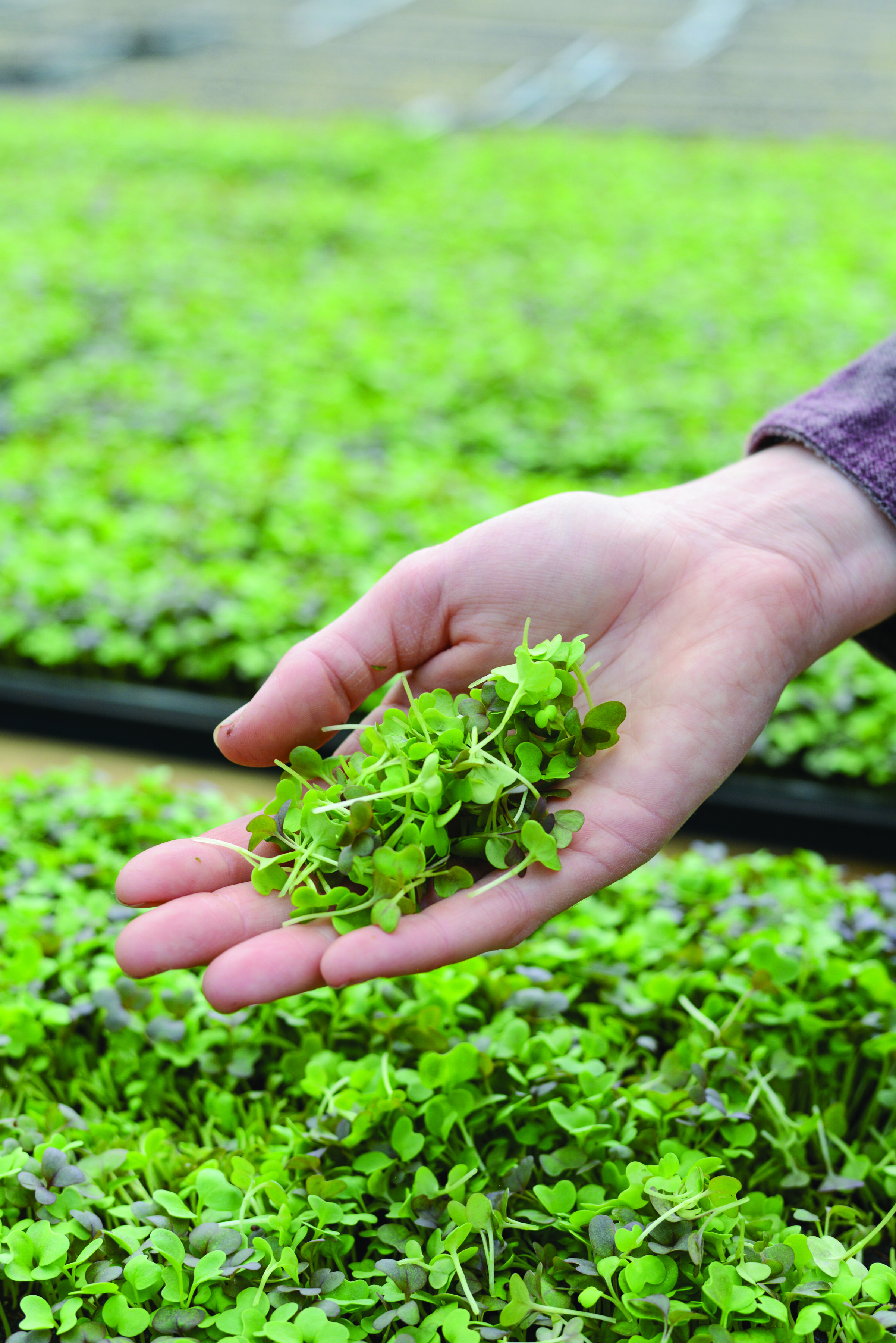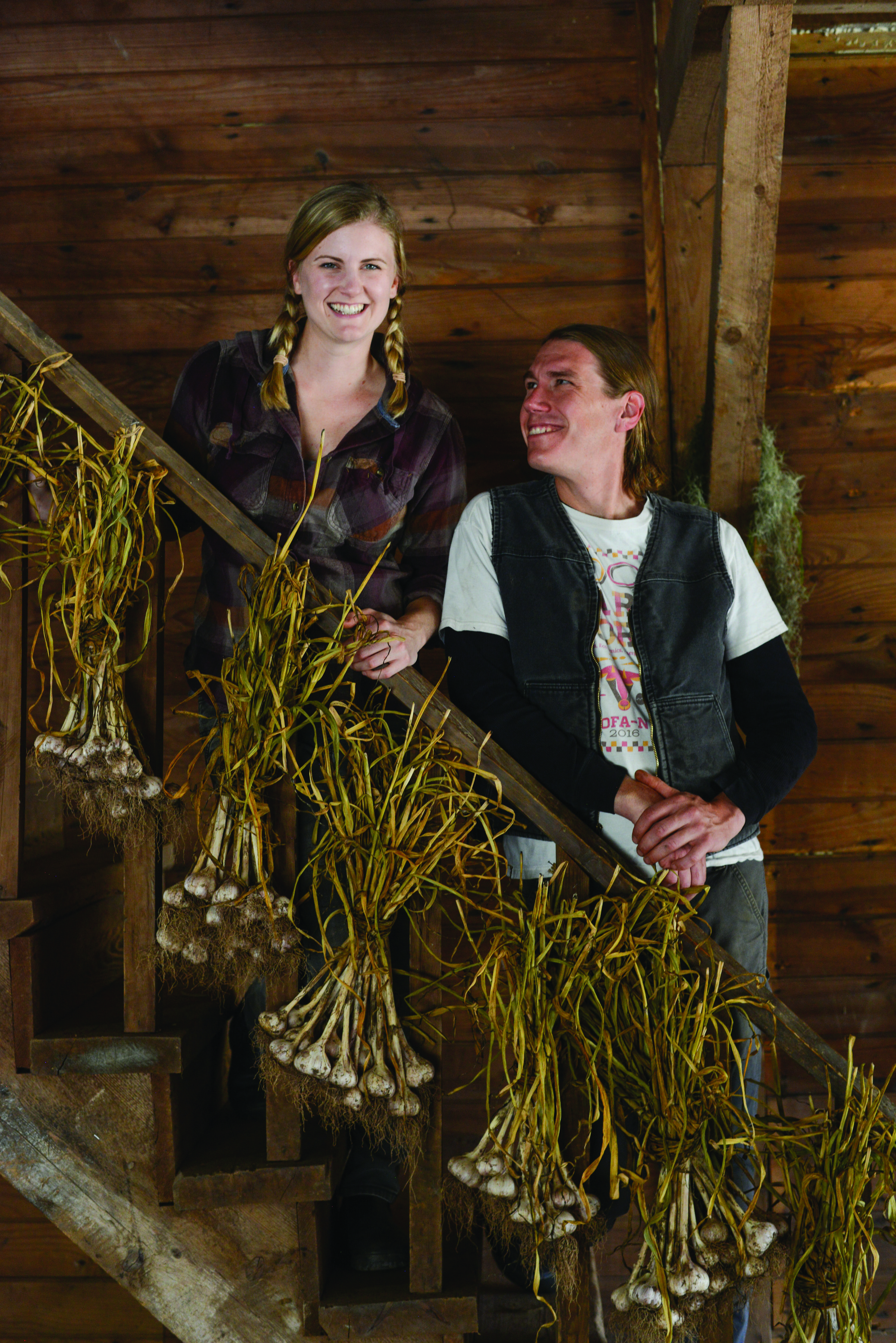Good, Clean Food
In the Mountaintop Community of Tannersville, an Organic Market Garden Flourishes
“We want to show that there are affordable tools that [people] can use to make farming easier and more approachable.”
“One of our main goals is to get people excited about vegetables in a way that’s more than just carrots in a salad,” says Dallas McCann, pulling something knobby and brilliantly purple from the ground. It’s my first experience with kohlrabi, which looks somewhat like a cross between a turnip and a red cabbage. Unsurprisingly, it’s a cultivar of wild cabbage, hailing from the same family as kale, cauliflower, and Brussels sprouts. He cuts off a piece for me; its taste is somewhere between apple, radish, broccoli stalk and onion — unusual, delicious, and difficult to imagine until you’ve tried it.
McCann and his partner, pastry chef Becky Kempter, are the duo behind Fromer Market Gardens, a year-old certified organic community farm owned by the nonprofit Hunter Foundation and located on Main Street in Tannersville, New York, just over three miles east of Scribner’s.
Since founding Fromer in 2018, McCann and Kempter have enjoyed introducing a host of fresh, flavorful vegetables and fruits to the Hunter-Tannersville community — especially things that aren’t found at your average grocery store, like bok choy, microgreens, and Boothby Blonde cucumbers. They grow shiitake mushrooms on red oak logs in the woods behind the farm, and keep bees — a slightly newer endeavor — from which they plan to release their first batch of local honey this fall.
McCann and Kempter met in their native California, while working at Sacramento restaurant The Waterboy (Kempter as a pastry chef, McCann as a backwaiter). McCann had always been interested in organic farming, but after reading “The Third Plate” by Dan Barber (chef and co-owner of Manhattan’s Blue Hill and Pocantico Hills’ Blue Hill at Stone Barns), he began to think more seriously about making it into a career.
After a stint in Seattle, where McCann farmed at Local Roots and Kempter made pastries at Salare, the pair made their way to Claryville, New York. There, he found work at Neversink Farm and she at Deer Mountain Inn — whose owner, Charles Royce, is one of the Hunter
Foundation’s main investors. It was through Royce that they learned of the Fromer project. Building a community market garden from the ground up has been “pretty much a dream opportunity for a young farmer,” says McCann. Now, he and Kempter live in a two-bedroom apartment on the property, and use biodiversity techniques to grow crops during all four seasons.
Market gardening, for those not familiar, is the practice of dense, soil-intensive farming on a relatively small piece of land. Fromer’s takes up just three-quarters of an acre. Instead of tractors and heavy machinery, McCann and Kempter employ innovative hand tools like the tilther, a lightweight, battery-powered tiller designed to work only the top inch of a bed (thereby preserving the soil’s organic matter in a way that a commercial tiller, which reaches much deeper into the soil, wouldn’t) and the flame weeder, a device that eliminates emergent weeds through heat shock. They also use an array of different all-natural pest control methods, including chalk spray, Safer soap, and sweet alyssum — so called because of its sweet, lively smell — a low-growing, flowering member of the mustard family that’s planted in a cluster on either end of each bed to attract beneficial insects like ladybugs and parasitic wasps (in short, bugs that eat other bugs).
Because of climate change, protected culture (or, the use of a controlled environment to grow food) is becoming the forefront of farming. It’s for this reason that McCann and Kempter designed and built an 8,000-square-foot greenhouse, complete with roll-open doors, thermal curtains, and automated heat and humidity functions.
The greenhouse is built to withstand heavy winds, rain, and snow, and has proved invaluable for growing vegetables during the colder seasons. In summer, it’s used to grow heat-loving crops like tomatoes, peppers, string beans, basil, celery, and even ginger. Inside, a number of space-maximizing techniques are employed, including “lower-and-lean,” a diagonal trellising method that allows indeterminate plants to grow in a denser way. Irrigation is drawn from well water, and collected water travels down the hill through pipes to a small reservoir at the bottom of the property. To pollinate the plants inside the greenhouse, Kempter and McCann release bumblebees. “Some farmers go around and touch each flower with an electric toothbrush,” says McCann. “I find this to be easier.”
Since arriving in Tannersville, McCann and Kempter have been heavily involved in community outreach. Each week, they donate a box of produce to a local food pantry. They’ve also created a community compost system, wherein residents from surrounding areas can drop off their compost at Fromer’s. That compost is then combined with the farm’s own to make new soil. The empty barn on the property has been used for workshops and events, including the Spring 2019 Hunter-Tannersville high school prom.
In their washing station, where they double-wash all produce, McCann has converted two gutted washing machines into giant makeshift salad-spinners. The goal here is demonstration. “We want to show that there are affordable tools that [people] can use to make farming easier and more approachable.” In the years to come, McCann and Kempter hope to increase their yield with another greenhouse. They’re also dreaming of a commercial kitchen where cooking classes could take place.
McCann and Kempter’s lovingly-grown produce can be found at a handful of restaurants and establishments in the area, but the best way to experience Fromer is to visit their road-facing farm stand, which is open to the public from 9am-3pm each Saturday and features seasonal produce alongside local eggs, artisanal breads, and Kempter’s own fresh-baked pastries (word has it that these sell out within the hour, so arrive early!). If you’re not around on a Saturday, the stand stays open on the honor system from Sunday through Tuesday. “People just want good, clean food,” says McCann. Each day at Fromer, he and Kempter work to bring them just that.
Written by: Annabel Graham
Photography by Casey Kelbaugh








